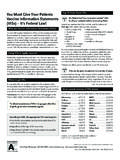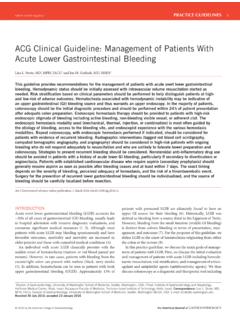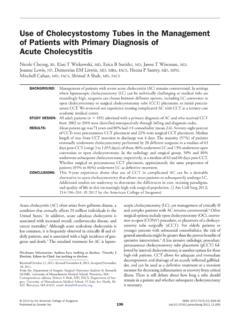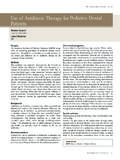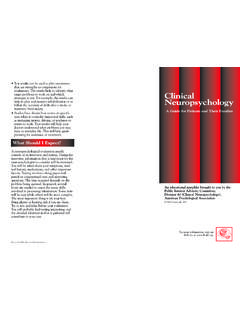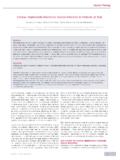Transcription of Dental management of patients before and after …
1 Stomatologija, Baltic Dental and Maxillofacial Journal, 2011, Vol. 13, No. 4 107 Dental management of patients before and after renal transplantationEleni A. Georgakopoulou, Marina D. Achtari, Niki Afentoulide SCIENTIFIC ARTICLESSUMMARYThe number of patients who are long-term survivors of renal transplantation increases rap-idly, and proportionally increases the demand of quality Dental care for this group of patients . All the transplant patients are on potent immunosupressants and also some of them may suffer from other systemic diseases, so their Dental management is a challenge for any dentist. This article is an update of the current relevant literature and is aimed to summarize the key points of Dental care for renal transplant patients , since no specifi c guidelines exist.
2 The research for relevant references took place by using Pubmed database, as well as information published by accredited medical societies and health services both in Greece and words: renal transplantation , Dental , Baltic Dental and Maxillofacial Journal, 13: 107-112, 20111 Department of Anatomy, Faculty of Medicine National and Kapodistrian University of Athens2 Dental Department Sotiria Hospital, Athens Greece Eleni A. Georgakopoulou1 MD, , MSc Oral Medicine (Eastman Dental Institute, UCL)Marina D. Achtari2 , MSc Public HealthNiki Afentoulide2 correspondence to Dr. Eleni A. Georgakopoulou, Vassilis-sis Sofi as 124b, 11526 Athens address: transplantation has been one of the medi-cal miracles of the 20th century and has improved the quality of life of thousands of patients who suffered from chronic end-stage kidney disease throughout the world.
3 These patients have had their life extended by replacing renal function by either peritoneal dialysis or artificial kidney dialysis, and transplantation is the best treatment choice for them (1). From 1988 until today, 301,072 kidney trans-plantations have taken place in the USA. Moreover, through new immunosuppressive therapies, signifi -cant progress has been made regarding the survival of k id ney t ra nspla nt s, wh ich is a fact t hat is expected to increase the advantages of transplantation in comparison to renal dialysis (2).As medical science progresses and the life expectancy of transplant patients increases, the number of such patients who will seek Dental care increases as well.
4 Dentists now play an active role in preparing a patient before the transplantation , as well as treating him/her afterwards (3). patients who suffer from renal failure need special treatment from the dentist, not only because of the side-effects of the treatment they already fol-low, but also because of the complications that may arise during Dental treatment (4, 5).For this reason, fi rst and foremost there should be a co-operation between the treating nephrolo-gist and the dentist so as to form a targeted Dental therapy plan. The aim is for the patient to reach the transplantation stage while having a healthy mouth, even if it is not possible to maintain the full dentition (3, 6).
5 By communicating with the treating nephrolo-gist, the dentist obtains information regarding the stage of the disease as well as the kind of treatment the patient receives. Thus, the best time for the pa-tient s Dental treatment is set so that the complications that may arise can be limited. Any change in the pharmaceutical treatment of the patient, as well as any invasive procedure should always take place in consultation with the treating doctor (7).This article analyses the provi-sion of Dental care for patients with re-nal disease before and after the trans-plantation, as this is indicated by the Table 1.
6 Causes that lead to trans-plantationDiabetesHypertensionGlom erulonephritisPolycystic Kidney Disease Other Urinary DiseasesOther Diseases108 Stomatologija, Baltic Dental and Maxillofacial Journal, 2011, Vol. 13, No. 4E. A. Georgakopoulou et al. REVIEWS existing protocols and medical instructions that are relevant to organ transplantation . The research for relevant bibliography took place by using Pubmed database, as well as information published by ac-credited medical companies and health services both in Greece and CAREWhat the dentist should bear in mindChronic Renal Failure is the development of the course of chronic diseases, which progressively destroy the nephrons, and is characterised by a gradual reduction in kidney function.
7 In order to make a quantitative assessment of the renal func-tion, the GFR (Glomerular Filtration Rate) (normal GFR values: 118-127 ml/min/1,73 m2) and the cre-atinine clearance (normal range 104-125 ml/min) are used (8).Medical HistoryA person suffering from kidney disease may suffer from various diseases as well. These diseases may either be related to the cause that leads to the transplantation (Table 1) or coexist (comorbidity). This is why a patient s medical history has to be checked carefully, so as to determine which further measu res must be t a ken du r i ng h is/ her dent al t reat-ment (9, 10).
8 MedicationThe patients may be taking numerous medi-cines that affect Dental procedures and have oral manifestations. These medicines include antico-agulant medicines, beta blockers, calcium channel blockers, diuretics, etc. The dentist has to be aware Table 2. Adjustment of commonly used in dentistry medication according to creatinine clearance (adapted from ref 5)Pharmaceutical substanceAdjustment based on Creatinine Clearance (ML/MIN)>5010-50<10 AntimicrobialsAmoxicillinUsual dosage every 8 hoursUsual dosage every 8 or 12 hoursUsual dosage every 12-18 hoursErythromycinRegular dosage and rate of administrationRegular dosage and rate of administrationReduced dosage to 50-75%ClindamycinRegular dosage and rate of administrationRegular dosage and rate of administrationRegular dosage and rate of administrationMetronidazoleRegular dosage and rate of administrationRegular dosage and rate of administrationReduced dosage to 50%AciclovirUsual dosage every 8 hoursUsual dosage every 12-24 hoursUsual dosage every 48 hoursKetoconazoleRegular dosage and rate of
9 AdministrationRegular dosage and rate of administrationRegular dosage and rate of administrationAnalgesicsAspirinRegular dosage and rate of administrationAdjustment of the rate of administrationAvoidParacetamolRegular dosage and rate of administrationRegular dosage and rate of administrationAdjustment of the rate of administrationIbuprofenRegular dosage and rate of administrationRegular dosage and rate of administrationAvoidDiclofenacRegular dosage and rate of administrationRegular dosage and rate of administrationAvoidNaproxenRegular dosage and rate of administrationRegular dosage and rate of administrationAvoidLocal anaestheticsLidocaineRegular dosage and rate of administrationRegular dosage and rate of administrationRegular dosage and rate of administrationMepivacaineRegular dosage and rate of administrationRegular dosage and rate of administrationRegular dosage and rate of administrationOTHERSP rednisoneRegular dosage and rate of administrationRegular dosage and rate of administrationRegular dosage and rate of administrationStomatologija, Baltic Dental and Maxillofacial Journal, 2011, Vol.
10 13, No. 4 109 REVIEWS E. A. Georgakopoulou et the side-effects of these medicines, which may vary from xerostomia to postural hypotension and hy perglycem ia , as well as t he i nteract ions w it h ot her medicines that he/she may prescribe. A lot of medi-cines that are usually used in Dental procedures, including nonsteroidal anti-infl ammatory drugs (NSAIDs), opioid analgesics and some antibiotics, are metabolised by the kidneys. before the dentist administers any medication, he/she should bear the renal function in mind. (patient s GFR after consulting with the nephrologists). The nephrologist m ig ht need to adjust eit her t he dosage or t he ad m i n-istration rate of a certain medicine (Table 2) (5, 11).

